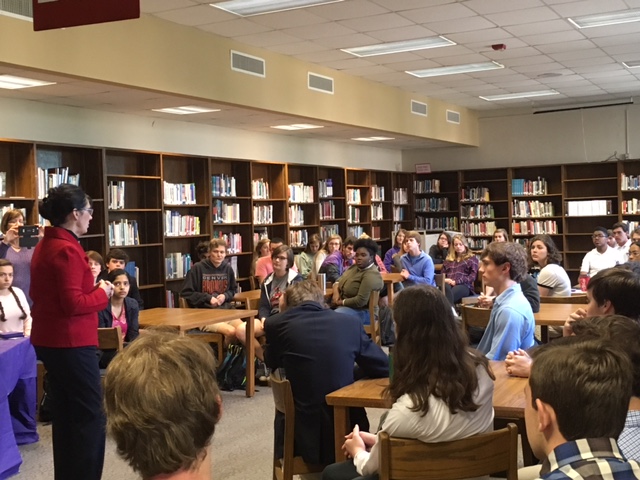Rep. Ball visits Broughton
Friday, April 7 — the last day before Spring Break — was full of yawns and can-I-go-home-yets.
But Spring Break was the last thing on the minds of students selected to meet North Carolina Representative Cynthia Ball, as they asked engaging questions and listened attentively.
Cynthia Ball is a representative in the North Carolina General Assembly and the Democratic Freshman Chair. She governs District 49 in Wake County. She came to speak to members of student government, as well as 10 AP Government students, 15 IB students, and 10 Civics and Economics students.
Before the discussion, members of the Broughton jazz band performed and adults ate refreshments from Rise.
The conversation began with the controversial House Bill Two, commonly known as HB2. Ball supported the recent decision to repeal part of HB2 without a complete repeal. This action was intended to bring protesting businesses back to North Carolina without ensuring complete LGBTQ rights protections.
Ball said the decision was a very difficult one for her.
“I knew what I was doing would disappoint a lot of people. I don’t apologize because I honestly think it was as good as we could do right now,” Ball said.
She hopes to create more protection for LGBTQ citizens soon, but knows with a supermajority of Republicans, this task will be difficult.
“Until we find a way to have a more balanced legislative, we will not pass, in my opinion, rights for LGBT people,” Ball said.
Ball also spoke on public education, something she feels passionate about and the thing that brought her into politics. She stressed the importance of free public education to improve society.
“A $1 investment in early education will yield $13 for the state later in life,” Ball said.
Beside HB2 and education, Ball spoke on minimum wage, the NC Education Lottery, and taxes.
Ball stressed the issues behind the Education Lottery, which only gives a fraction of its earnings to education. She explained that many of the people who buy lottery tickets are below the poverty line, so the lottery actually hurts the lower class more so than it improves education.
Throughout her discussion, Ball called students to action.
“All of you, go home and talk to your parents. Keep that pressure on. Write me, call me. I’m in the minority and there’s not a lot I can do, but there’s a lot you can do. My voice is one of man, but your voice is many of one,” Ball said.

